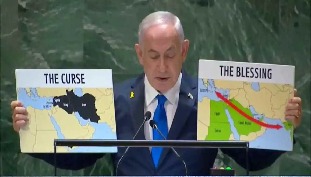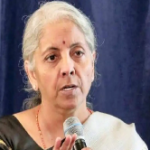Israeli Prime Minister Benjamin Netanyahu spoke at the United Nations (UN) , saying that Israel seeks peace even as it fights for its survival against “savage enemies” aiming for its destruction. During his speech, Netanyahu displayed two maps of the region. One was named “Blessing,” showing Israel’s efforts to build infrastructure with partners. The other was called “The Curse,” referring to Iran, Iraq, and Syria.
Netanyahu Displays ‘Blessings’ Vs ‘Curse’ Map
In his right hand, Netanyahu held a map of the Middle East, showing Iran, Iraq, Syria, and Yemen painted in black and labeled “The Curse.” In his left hand, he had a map with countries like Egypt, Sudan, Saudi Arabia, and even India painted green and called “The Blessing.”
What stood out most about both maps was the complete absence of Palestine. There was no mention of it in either the green “blessing” map or the black “curse” map.
Netanyahu Warns Of Retaliation, Highlights Israeli Resilience
“If you attack us, we will retaliate,” Netanyahu said. “There is no part of Iran that Israel cannot reach, and the same goes for the entire Middle East: Rather than being victims, Israel’s soldiers have fought back with remarkable bravery and sacrifice.”
Netanyahu spoke at a mostly empty General Assembly, with some delegates leaving during his speech. However, those who stayed applauded loudly. The U.S. Ambassador to the United Nations, Secretary of State Antony Blinken, was noticeably absent, as he was hosting a global health security event nearby.
He said he nearly didn’t attend the U.N. High-Level Week but felt it was necessary to “set the record straight,” including presenting the choices the world faces.
Netanyahu brought several families of hostages held by Hamas in Gaza to New York and repeated his call for their release, stating, “I’ll say this one more time: we remain focused on our sacred mission to bring our hostages home, and we will not stop until that mission is complete.”
India’s Relation With Israel
In the past few years, India and Israel have developed bilateral relations.
India-Israel Sign Nine Agreements
During the Israeli Prime Minister’s visit to India in January 2018, the two countries signed nine agreements covering different sectors, including cyber security, oil and gas, solar energy, space science, air travel, medicine, and film production.
Israeli Ministers Past Visit To India
In April 2023, Israeli Minister of Economy and Industry, MK Nir Barkat, visited India accompanied by a 15-member business delegation.
Israeli former Foreign Minister Eli Cohen visited India in May 2023 with a high-level business delegation. FM Cohen co-chaired the India-Israel Business Forum during the visit with India’s Minister of Jal Shakti. Israeli Minister of Transport and Road Safety Miri Regev visited India in February 2024.
India – Israel Trade Ties
The country ranks second to Israel in Asia as a trading partner. The main trade between India and Israel is diamonds, petroleum products, and chemicals, increased trade has recently been noted in such areas as electronic machinery, high-tech products, communications systems, and medical equipment. India remains an important target for the Israeli government’s efforts to promote trade.
India: Israel’s Second-Largest Asian Trading Partner
India is Israel’s second-largest trading partner in Asia. Though diamonds, petroleum products, and chemicals make up most of the trade between the two countries, electronic machinery, high-tech products, communication systems, and medical equipment have seen increases in trade in recent years. India has remained one of the key foci of the Israeli government’s efforts to boost trade.
Major Exports From India To Israel
Major export articles of India to Israel include pearls and precious stones, automotive diesel, chemical and mineral products, machinery and electrical equipment, plastics, textiles and apparel, base metals, transport equipment, and agricultural products.
Major Exports From Israel To India
Israel’s key exports to India include pearls and precious stones, chemical and mineral/fertilizer products, machinery and electrical equipment, petroleum oils, defense equipment, and transport machinery.
Chabad House Targeted During 26/11 Mumbai Attacks
During the 2008 Mumbai attacks, one of the chosen places was Nariman House, or “Chabad House.” Six Israeli nationals were mercilessly tortured there, as the terrorists had chosen this place deliberately. The victims included Rabbi Gavriel Holtzberg and his wife Rivka, who ran the Chabad House. Sandra Samuel, an Indian nanny for the Holtzbergs, took a huge risk by saving their little son Moshe, who was only two years old. Tel Aviv offered help to India, which New Delhi politely denied.



